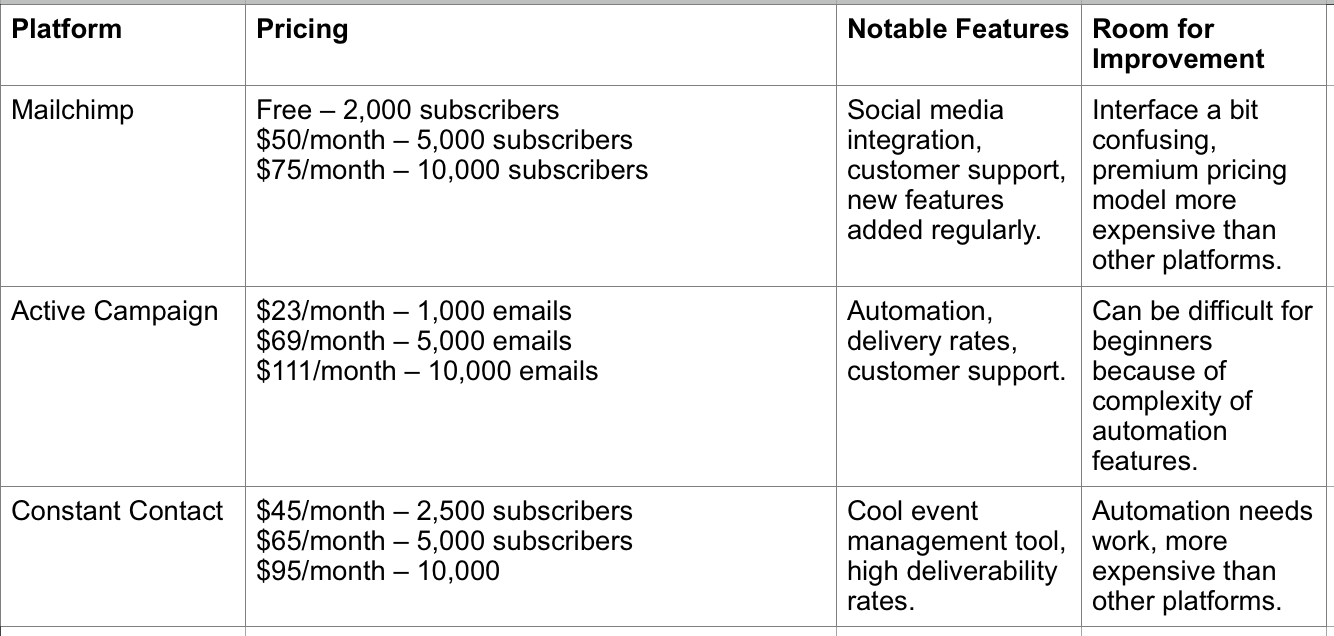Why use email to talk to your customers, what tools to use, and how to build your list
There’s a reason why 80% of marketers see email as the top driver for customer acquisition and retention – it actually works! It keeps your consumers engaged with your product or service, gives you opportunities to push new offers, and it performs better than any other digital channel when it comes to nurturing leads, acquiring customers, and generating new and recurring sales.
Plus it’s the best return you’ll get on your investment. For every dollar you spend on your email list, expect a $40 return on investment (ROI). That’s more efficient than social media, content marketing, and even mobile ads. It also helps that customers who receive product emails spend 138% more than those who don’t receive any emails.
Popular email marketing tools for small businesses
OK, so now you know that email marketing is still the best way to engage users. But before you start finding fun ways to collect a bunch of customer emails (more on that later), you’ll need to choose an email marketing platform that works for your business.
A few things you should consider in your search for the right email tool for your business:
- The cost of using each email marketing platform
- The ability to manage and segment your contacts into groups is a must. Purchase cycle, geography and age are good ways to start grouping
- A way to measure the performance and success of your different segments, split tests, and emails
Some of the more popular email marketing platforms that check all of these points include Mailchimp, Constant Contact, Drip, Active Campaign and ConvertKit, but there are others that work just as well. Mailchimp is the one you’ve probably heard of. It lets you manage up to 2,000 subscribers and 12,000 emails at no cost. Constant Contact is the fastest growing platform. Their tracking tools are simple and they house social media sharing tools within their platform.
Here’s a quick view of the top 3 email marketing platforms for small businesses you might want to consider:
Steps to successfully build an email list for your business
Now this is the tough part. Building an email list isn’t going to be easy, but if you follow a few simple steps, you’ll be ahead of the game and pulling in email addresses by the bundle. There’s almost no limit on how creative you can get when trying to collect emails, but the following tips are a solid foundation to whatever strategy you choose:
- You have to give to receive: Ask yourself what you’re willing to give away in exchange for a consumers email address. Is it a free e-book, a chance to win a contest, a discount on one of your top selling products? Whatever you choose should be compelling enough to convince consumers that it’s worth their personal info.
- Great content still matters: Here’s the thing about building an email list – your content must be useful, informative, and customized just enough to make your consumer feel special. Sending pointless content that doesn’t speak to your audience or doesn’t offer any meaningful information is as good as spam and will have consumers hitting the unsubscribe button in a hurry.
- Collect Offline: So many new small businesses make the mistake of only using online strategies to build their email list. Truth is, offline strategies are just as effective. If you have a physical store, put a sign up sheet at the front. If you go to an event, make sure that sign up sheet is front and centre. Anywhere people gather is an opportunity to collect emails. Don’t waste it.
Tip: Don’t forget to ask for consent when collecting email addresses for marketing purposes – in Canada, you need to have explicit consent in order to email someone. Learn more about CASL (Canadian Anti-Spam Legislation).
As a new and growing business, you’ll realize how crucial mailing lists are for acquiring, engaging, retaining, and selling to customers. Don’t sleep on this. Get started on building that list on day one.
This article offers general information only, is current as of the date of publication, and is not intended as legal, financial or other professional advice. A professional advisor should be consulted regarding your specific situation. While the information presented is believed to be factual and current, its accuracy is not guaranteed and it should not be regarded as a complete analysis of the subjects discussed. All expressions of opinion reflect the judgment of the author(s) as of the date of publication and are subject to change. No endorsement of any third parties or their advice, opinions, information, products or services is expressly given or implied by RBC Ventures Inc. or its affiliates.



